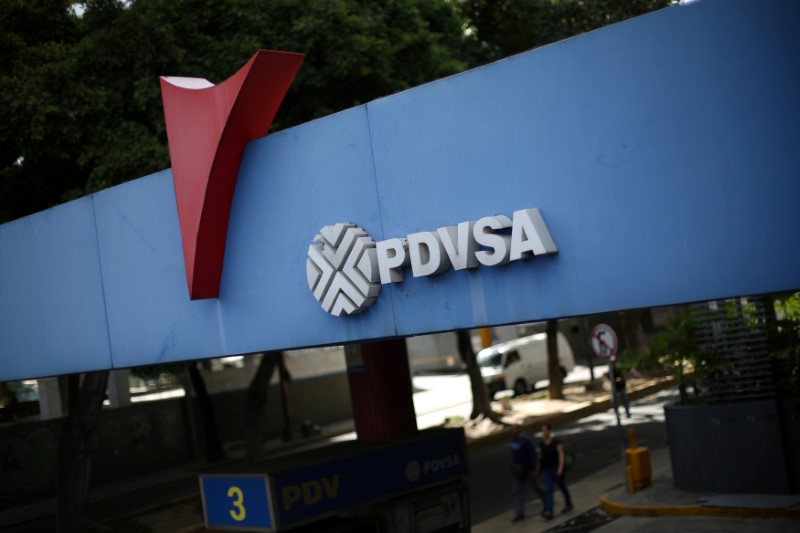By Marianna Parraga
HOUSTON (Reuters) - Venezuela's state-run petroleum firm PDVSA has been barred from using a NuStar Energy (N:NS) oil storage terminal in the Caribbean over $26 million in unpaid bills, according to documents reviewed by Reuters, halting delivery of a cargo to an oil trader.
The suspension was triggered when PDVSA missed a payment for use of NuStar's Statia facility on the island of St. Eustatius, according to company documents viewed by Reuters.
"We should not load this cargo," wrote NuStar Vice President James Calvert in response to a loading request, according to one document.
NuStar's refusal to retrieve the oil over what amounts to nearly a year's worth of monthly fees shows how recurring legal and trade disputes are disrupting PDVSA's ability to deliver its oil to foreign customers, which generate more than 90 percent of the country's export revenue.
Shipping delays and quality concerns also are jeopardizing the OPEC-member country's crude sales, the lifeblood of its troubled economy.
The suspension comes months after PDVSA had expanded its NuStar storage contract following a payment dispute with Buckeye Partners (N:BPL) over a Bahamas storage facility. Both U.S. firms operate key transit hubs for companies that move oil through the Caribbean.
NuStar declined to comment. PDVSA did not respond to a request to comment.
NuStar's refusal and other details of PDVSA's payment problems emerged after trader Trafigura [TRAFG.UL] sought to load a cargo of Venezuelan oil held at Statia. Trafigura was the winner of a court-ordered auction of the heavy crude intended to help resolve a separate billing dispute between PDVSA and units of Russian state-run conglomerate Sovcomflot
Trafigura declined to comment on the auction or whether it expects to receive the cargo. Sovcomflot also declined to comment.
NuStar first sought fees for the stored oil from PDVSA. On Oct. 10, after receiving no response from the Venezuelan firm, NuStar sent a $287,500 invoice to Sigma Navigation, a unit of Sovcomflot. NuStar offered to allow the oil to be loaded by Oct. 20 if payment was made before that date.
That request led to a series of exchanges between representatives of the three companies. In one, a law firm representing Sigma alerted PDVSA's lawyers that its client was willing to pay the NuStar bill but reserved the right to seek repayment as part of the broader claim, according to documents.
Sigma's lawyers also revealed in emails that, according to its talks with NuStar, the U.S. firm was claiming PDVSA owed it another $26 million for accumulated unpaid Statia storage fees.
LONG TRIP
The tangled story of the oil cargo at the heart of the dispute began a year ago, when PDVSA sent 550,000 barrels of crude oil to St. Eustatius on tanker NS Columbus rented from Sovcomflot. The oil had been sold to Norway's Statoil (OL:STL), which planned to retrieve it at Statia.
Before it could get there, Sovcomflot had a St. Maarten court freeze the delivery in hopes of collecting partial payment for shipping fees unpaid by PDVSA. Five months after crossing the Caribbean, the court ordered the tanker to discharge its cargo at Statia.
Trafigura's attempts to obtain the oil first were delayed due to force majeure declared by NuStar due to Hurricane Irma, and later over the unpaid bills between PDVSA and NuStar.
"We are facing a delay in the payment for the use of such facilities and related services contracted there. PDVSA is doing its best to catch up with outstanding debts, but has not made any special arrangements to cover the storage costs of the relevant tank," a PDVSA official wrote in an email in October.
The PDVSA official explained that "since June no payment has been made to NuStar," but also said that a payment schedule was proposed to the U.S. firm in a meeting in September in Caracas, with a first installment of $2.3 million planned for October.
According to the schedule, 10 percent of the accumulated debt was to be paid from October through December, with a one-time additional payment due in January and the remainder paid off through 10-percent monthly installments.
PDVSA has not yet paid the October installment, according to a PDVSA source, prompting NuStar's refusal to load.
In a memorandum to PDVSA's finance chief, Simon Zerpa, the oil company's trade and supply department warned further payment delay to NuStar could result in possible tanker embargoes, broken supply contracts with Caribbean customers and a shortage of fuels for Venezuela's domestic market.
In the September meeting, PDVSA suggested it could terminate a related contract with NuStar for fuel oil tanks rental and sublease a portion of its Statia storage to an undisclosed firm as a way to reduce further debts.
NuStar countered that PDVSA could pay off the debt with oil, or by allowing it to become a partner in the state-run company's terminal on the island of Bonaire along with a partial payment to show good faith.
It is unclear if any agreement on topics different than the payment schedule was reached.
